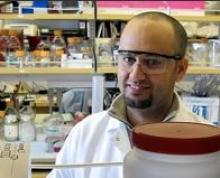Mufadhal Al-Kuhlani came to UC Merced to help reduce the threat of harmful diseases through innovative research.
Al-Kuhlani is studying immunology within the Quantitative and Systems Biology graduate program. He's working with Professor David Ojcius to better understand chlamydia.
 More than 1.2 million cases of the disease were reported to the Centers for Disease Control and Prevention in 2009. Chlamydia represents the world's leading cause of preventable blindness and is a common cause of respiratory and sexually-transmitted infections in humans.
More than 1.2 million cases of the disease were reported to the Centers for Disease Control and Prevention in 2009. Chlamydia represents the world's leading cause of preventable blindness and is a common cause of respiratory and sexually-transmitted infections in humans.
"It touches so many lives; a lot of people get infected," Al-Kuhlani said. "It's preventable and treatable. There are many cases that shouldn't happen in the first place."
The lab is looking at the body's immediate reaction when infected and for ways the disease could be controlled. The goal is understand what mechanisms are involved in manipulating the infectious activity of chlamydia in the human body and to see if they can limit the infectious activity in the human body.
Al-Kuhlani, who's planning to graduate in May, is applying for postdoctoral fellowships at other universities. After that, he wants to go into academia to teach and continue researching. Al-Kuhlani, from Yemen, has seen how malaria has plagued his home country and is interested in shifting his research into addressing that disease.
Al-Kuhlani received his bachelor's degree in clinical laboratory sciences from the University of Kansas before going to University of Missouri to work as a research specialist. He learned of UC Merced from a friend who thought he should consider it for graduate school. He said he was interested in attending a university that would give him close interaction with a variety of faculty members in different disciplines, and he’s found that at UC Merced.
"For a young researcher, it's better to have more connections," he said. "Here you can go and talk to anyone."

